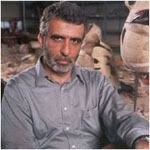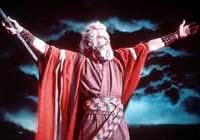At the same time, I spotted an item in the 31 May issue of NS that I'd somehow missed.

The article was about Israeli archaeologist Israel Finkelstein. I should advise you at this point that New Scientist only lets you see all of an article if you have a subscription to it - unlike, say, Scientific American. But if you neither subscribe nor have any friends who do (or if you're a top-level anorak and don't have any friends), some higher institutes might let you browse their magazines for free or for a small charge.
I mention this matter of only printing the first couple of hundred words of an article because what the website shows you is misleading, in that it gives the impression that the interview is somewhat reasonable. But have a look at what comes in the paper interview, shortly after the electronic copy ends:
"The exodus of the Israelites from Egypt never happened, and Joshua never attacked Jericho...David and Solomon were not great kings who ruled over the ancient land of Canaan in the 10th century BC from a palace in Jerusalem, as the Bible portrays; at best they were chieftains of some small-time tribe in that area."
 It seems, upon first examination, that NS is having a rest from its usual habit of Christian-baiting, and having a go at the Jews. It is certainly doing the latter, but think on as well: if there were no Exodus, then the Passover ritual is built on a myth, therefore the Last Supper was rootless. Joshua, who led his people into the promised land, was also the name of another Prophet which was to be rendered in Latin as Jesus. His genealogies in Matthew 1 and Luke 3 might not be unproblematic, but the great kings David and Solomon feature in both as claims of Jesus' kingship. As an archaelogist in the Holy Land who specialises in Biblical sites, I think Professor Finkelstein knows what he is doing by attempting to deconstruct the pertinence of the parts played by the Exodus, Joshua, David and Solomon to the religious lives of Jews and Christians alike.
It seems, upon first examination, that NS is having a rest from its usual habit of Christian-baiting, and having a go at the Jews. It is certainly doing the latter, but think on as well: if there were no Exodus, then the Passover ritual is built on a myth, therefore the Last Supper was rootless. Joshua, who led his people into the promised land, was also the name of another Prophet which was to be rendered in Latin as Jesus. His genealogies in Matthew 1 and Luke 3 might not be unproblematic, but the great kings David and Solomon feature in both as claims of Jesus' kingship. As an archaelogist in the Holy Land who specialises in Biblical sites, I think Professor Finkelstein knows what he is doing by attempting to deconstruct the pertinence of the parts played by the Exodus, Joshua, David and Solomon to the religious lives of Jews and Christians alike.I'm not criticising Finkelstein for being a non-believer who states he celebrates the festivals and keeps kosher at home. Religion forms our identities as well as our beliefs. Minora once asked an Irish friend of mine "Are you a Catholic?" Although an atheist, he replied "Yes, culturally I'm Catholic."
Another secular Jew is David Berlinski. The subtitle of his latest book, "The Devil's Delusion", is "Atheism and its Scientific Pretensions". Although the Second Vatican Council document Lumen Gentium states that "believers can have more than a little to do with the birth of atheism", Berlinski is dealing with that sort of radical militant atheism that seeks not just to push religion out of educational and scientific establishments, but to supplant it altogether. His main thesis is that science finds proof of the bankruptcy of religion for no other reason than those of its practitioners who are fêted by the media have set its parameters specifically to find this proof.
So with Finkelstein, who tells NS that "My family arrived in the mid 19th century from Grodno [in what is now Belarus] to Hebron. I don't need any more legitimacy than that, not does the state of Israel need the Bible to justify its right to exist."
By these criteria, my family's Irish heritage justifies my presenting myself for Holy Communion without need of reference to Christianity, but conceivably my Parish Priest might disagree. Similarly, the second paragraph of Israel's Declaration of Independence refers to Biblical happenings:
After being forcibly exiled from their land, the people remained faithful to it throughout their Dispersion and never ceased to pray and hope for their return to it and for the restoration in it of their political freedom.The same Constitution calls on the Arab occupants of Israel to join the Jews in "full and equal citizenship". In the same way that all religions in Israel have an interest in peace, all religions worldwide have an interest in fighting the sort of radical militant atheism which seeks to uproot the lot of them, for which New Scientist is a poster-boy, and for which inter-religious strife is one of the most useful tools in the armoury. I hope that the truce bears fruit, and that its progress is reported even-handedly.
PS - question: do you notice something about the two pictures associated with the BBC story linked to at the start of this post? Clue - have a look at the captions.











No comments:
Post a Comment
Please feel free to leave a comment - Frugal Dougal.